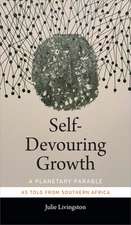Improvising Medicine – An African Oncology Ward in an Emerging Cancer Epidemic
Autor Julie Livingstonen Limba Engleză Paperback – 28 aug 2012
Preț: 203.34 lei
Nou
Puncte Express: 305
Preț estimativ în valută:
38.92€ • 42.29$ • 32.72£
38.92€ • 42.29$ • 32.72£
Carte tipărită la comandă
Livrare economică 22 aprilie-06 mai
Preluare comenzi: 021 569.72.76
Specificații
ISBN-13: 9780822353423
ISBN-10: 0822353423
Pagini: 248
Ilustrații: 13 photographs, 1 map
Dimensiuni: 159 x 235 x 18 mm
Greutate: 0.34 kg
Editura: MD – Duke University Press
ISBN-10: 0822353423
Pagini: 248
Ilustrații: 13 photographs, 1 map
Dimensiuni: 159 x 235 x 18 mm
Greutate: 0.34 kg
Editura: MD – Duke University Press
Recenzii
Improvising Medicine is a luminous book by a highly respected Africanist whose work creatively bridges anthropology and history. A product of intense listening and observation, deep care, and superb analytical work, it will become a canonical ethnography of medicine in the global south and will have a big impact across the social sciences and medical humanities. João Biehl, author of Will to Live: AIDS Therapies and the Politics of Survival and Vita: Life in a Zone of Social Abandonment"Improvising Medicine is as good as it gets. It is a book that will be read for decades to come. I have always thought that great ethnography transcends the specificities of time and place, of the particular, to offer a glimpse of the universal. This gripping book does just that, and the subtle and grounded way that it speaks to global health and debates in medical anthropology make it a major addition to both fields." Vinh-Kim Nguyen, M.D., author of The Republic of Therapy: Triage and Sovereignty in West Africa's Time of AIDS
"Improvising Medicine is a luminous book by a highly respected Africanist whose work creatively bridges anthropology and history. A product of intense listening and observation, deep care, and superb analytical work, it will become a canonical ethnography of medicine in the global south and will have a big impact across the social sciences and medical humanities." Joao Biehl, author of Will to Live: AIDS Therapies and the Politics of Survival and Vita: Life in a Zone of Social Abandonment "Improvising Medicine is as good as it gets. It is a book that will be read for decades to come. I have always thought that great ethnography transcends the specificities of time and place, of the particular, to offer a glimpse of the universal. This gripping book does just that, and the subtle and grounded way that it speaks to global health and debates in medical anthropology make it a major addition to both fields." Vinh-Kim Nguyen, M.D., author of The Republic of Therapy: Triage and Sovereignty in West Africa's Time of AIDS
"Improvising Medicine is a luminous book by a highly respected Africanist whose work creatively bridges anthropology and history. A product of intense listening and observation, deep care, and superb analytical work, it will become a canonical ethnography of medicine in the global south and will have a big impact across the social sciences and medical humanities." Joao Biehl, author of Will to Live: AIDS Therapies and the Politics of Survival and Vita: Life in a Zone of Social Abandonment "Improvising Medicine is as good as it gets. It is a book that will be read for decades to come. I have always thought that great ethnography transcends the specificities of time and place, of the particular, to offer a glimpse of the universal. This gripping book does just that, and the subtle and grounded way that it speaks to global health and debates in medical anthropology make it a major addition to both fields." Vinh-Kim Nguyen, M.D., author of The Republic of Therapy: Triage and Sovereignty in West Africa's Time of AIDS
Notă biografică
Cuprins
Descriere
A profound reflection on the social orchestration of hope and futility in an African hospital, the politics and economics of healthcare in Africa, and palliation and disfigurement across the global south


















